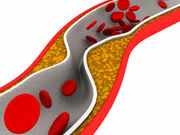Clinician-patient discussions on guideline-supported therapies can be informed by data
TUESDAY, July 5, 2016 (HealthDay News) — Patients with heterozygous familial hypercholesterolemia (FH) have a significantly increased risk for coronary heart disease (CHD) and atherosclerotic cardiovascular disease (ASCVD), according to research published online June 29 in Circulation.
The researchers reviewed data from six groups of individuals involved in previous studies. Compared to participants with average low-density lipoprotein cholesterol levels (<130 mg/dL), those with FH had a five times higher risk for CHD.
Those with FH were also more likely to have ASCVD up to 20 years earlier in men and 30 years earlier in women. Even when the researchers included other risk factors for cardiovascular disease in their analysis, the risks were still higher for those with FH.
“In the general U.S. population, the long-term ASCVD burden related to phenotypic FH, defined by low-density lipoprotein cholesterol ≥190 mg/dL, is likely substantial,” the authors write. “Our finding of CHD risk acceleration may aid efforts in risk communication.”
Full Text
Copyright © 2016 HealthDay. All rights reserved.








